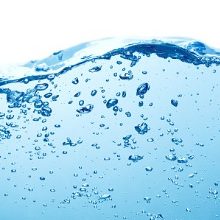Using microbiology for safe drinking water
18 February 2020

Researchers are working on a sustainable way to remove poisonous toxins from drinking water. A team of scientists from Robert Gordon University, Aberdeen, are looking into ways to remove toxins released by cyanobacteria from drinking water.
Excessive growth of cyanobacteria – also known as blue-green algae – can cause cyanotoxins to be released into water. These toxins can cause liver damage and also irritate the skin and eyes.
In Sri Lanka, cyanotoxins are a substantial problem, with blooms of blue-green algae becoming more common due to climate change and pollution. According to Dr Sylvia Soldatou, Research Fellow at Robert Gordon, these toxins have a huge impact on public health in Asian countries: “In Sri Lanka’s rural areas, freshwater supply heavily relies on single household dug wells in which we have identified the presence of cyanobacteria cells as well as potent cyanotoxins at levels alarmingly higher than the World Health Organization (WHO) guidelines."
“It is concerning that the toxins have been detected throughout the year in the dug wells, which can result in chronic illnesses […] Unfortunately, everyone could be vulnerable including humans and livestock.”
Dr Soldatou has developed a method of making water safe to drink using sustainable, affordable materials local to Sri Lanka. She said: “By using micro-organisms capable of degrading cyanotoxins we avoid the use of chemicals. Additionally, local communities can benefit from the use of agricultural waste to produce biochar which can be useful for a wide range of applications such as fertiliser with the bonus of gas generation as it is produced providing an alternative energy source.”
The method uses a porous, charcoal-like substance called biochar to remove microcystins – a group of cyanotoxins that damage the kidneys and liver – out of water. This is achieved by coating the biochar with bacteria that are known to break down microcystins and using it to filter contaminated water.
The approach for water treatment is nature-based. First, biochar is made by burning organic local agricultural waste materials, such as coconut shells. The biochar is then coated with bacterial isolates local to Sri Lanka such as Alcaligens, Roseateles, Bacillus and Micrococcus. Dr Syldotou said “Bacteria have the ability to degrade microcystins via enzymatic pathways. The exact way in which they are capable of degrading cyanotoxins, is not known for all toxins in all bacteria. However, it is remarkable that bacteria can rapidly degrade these toxins to non-toxic by-products, and it has been found that natural microbial consortia, even with no previous exposure to specific toxins, can degrade them.”
“Although this project is in its early stages, we have already collected interesting preliminary data demonstrating the ability of natural-occurring colonies to immobilize on biochar. There is a lot of work for the near and long-term future, including the final determination of the optimum biochar properties that will enable immobilization. Most importantly, field trips will be carried out in the dug wells in Sri Lanka to deploy the biochar immobilized microbes and monitor in situ the degradation of microcystins and other cyanotoxins.”
Cyanobacterial blooms are caused by excessive growth of cyanobacteria. This often occurs in stagnant or slow-moving water when temperatures are high and there are high concentrations of phosphorous and nitrogen. In Sri Lanka, cyanobacterial blooms are becoming more common due to climate change and water being polluted by agricultural, industrial and domestic waste.
In areas without water treatment, cyanobacterial blooms often occur in drinking water, leading to consumption of dangerous toxins which can even be fatal. There are increasing reports of chronic kidney disease in Sri Lanka, and Dr Soldatou believes this could be caused by drinking water contaminated with microcystins: “There is evidence that cyanotoxins could be implicated in the increased occurrence of occurrence of chronic kidney disease (CKDu) of unknown cause.”
Dr Soldatou will present her research as part of the Microbial toxins as weapons of warfare? session at the Microbiology Society’s Annual Conference in Edinburgh this year. Her talk, titled ‘Safe water for all: A nature-based approach for cyanotoxin elimination from potable water’, will take place at 16:15 on Tuesday 31 March.
Image: iStock/Oleksii Polishchuk.


